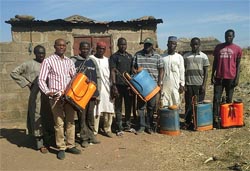Contract sprayers applying pesticides for a fee for farmers in Borno state in Nigeria do not follow responsible use practices.
- 10% do not wear any protective equipment;
- 40% do not read the label;
- 30% do not triple rinse the empty container;
- more than 60% leave the empty containers on the farm.
These are some of the conclusions of an assessment carried out by CropLife Nigeria on behalf of the N2Africa project.
Resulting from the negative results of the assessment carried out at the end of 2015, N2Africa has asked CropLife Nigeria to train 45 of the contract sprayers to become proper Spray Service Providers and link them to member companies.
Assessment contract sprayers
For the assessment a total of 50 farmers and 50 contract sprayers were interviewed, while 20 contract sprayers conducted the application test that is normally given to Spray Service Providers as part of their CropLife training.
|
For the assessment a total of 50 farmers and 50 contract sprayers were interviewed, while 20 contract sprayers conducted the application test that is normally given to Spray Service Providers as part of their CropLife training. The interviews were conducted by extension officers after receiving instructions from Siji Ofoesuwa, the SSP coordinator of CropLife Nigeria. The practical test was conducted by Siji. |

Siji Ofoesuwa (in striped shirt) with some of the contract sprayers |
Most of the interviewed contract sprayers (76%) have worked for more than 2 seasons as a contract sprayer. However, 35% did not undergo any training on the application of pesticides, and for those that did, for more than half did so more than 2 seasons ago. In 94% of the cases, the training program was only 1-day intervention. There seems to be enough work, as for most of the contract sprayers, their activities are almost a fulltime job with more than half working in excess of 20 days per month.
Challenges
The contract sprayers mentioned several challenges:
- 70% indicated that buying quality pesticides is a problem;
- 50% had problems with reading the label;
- 65% mentioned a lack of knowledge on which pesticide to buy.
The outcome of the practical test that was undertaken by 20 of the group, was exceptionally poor: 8 did not score a single point, meaning that they did everything wrong. Only 2 succeeded in scoring 41%, which is still not sufficient to be an approved contract sprayer (minimum score is 60% for this).
Among the farmers that make use of the services of the contract sprayers, 90% are extremely satisfied or very satisfied with the work undertaken, and 93% indicated that they would definitely use these services again. This clearly shows that farmers also need more information on the correct use of application. Farmers use contract sprayers to apply herbicides on maize, cowpeas, soyabeans and groundnuts. The knowledge of the contract sprayer on application and pesticides is mentioned as the main reasons for farmers to use their services (76%).
Spray Service Providers Network
As part of the assessment, CropLife Nigeria recommended to give every contract sprayer the full Spray Service Providers training course, paying special attention to the practical exercises. The focus of the training would be on:
- Herbicides;
- The importance of wearing protective equipment;
- Handling wastewater after triple rinsing;
- Disposal of empty containers;
- No involvement of children in any activity related to pesticide handling or application.
It would also include the need to create awareness among farmers that make use of contract sprayers, on the correct manner for the disposal of empty containers, that children are never allowed to be involved in any activity related to pesticide handling or application, and the importance of buying and using good quality pesticides.
Based on these recommendations, N2Africa agreed to have CropLife set up a network of Spray Service Providers in Borno state. The first activities are likely to start in March 2016.
Manon Dohmen (Summary from CropLife Africa Middle East Newsletter article by Minke Stadler) Link to the full newsletter.
